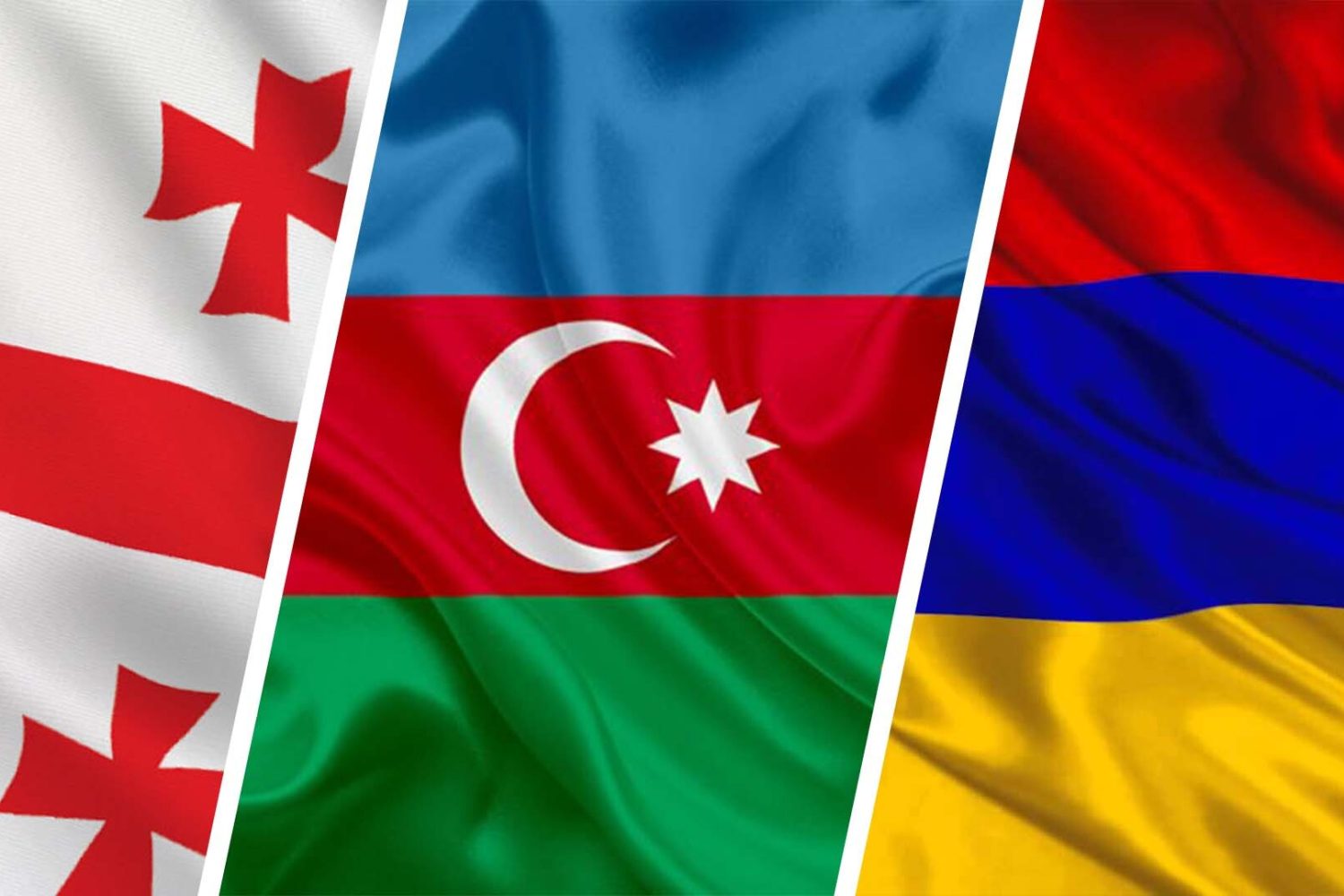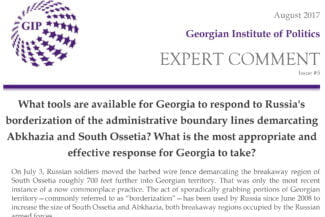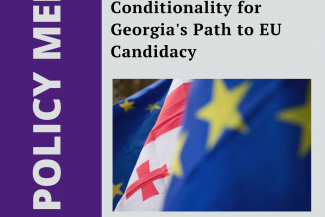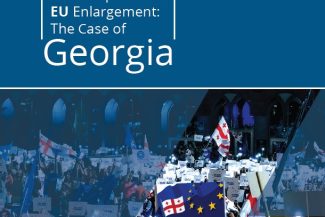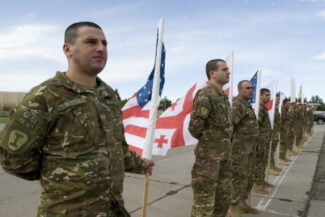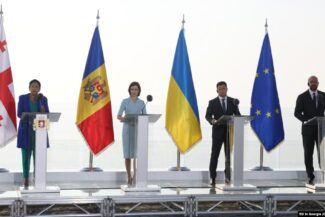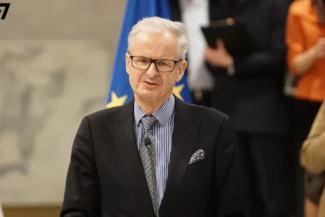
Author
S. Neil MacFarlane
S. Neil MacFarlane, Lester B Pearson Professor of International Relations, The University of Oxford
The last six months have awakened many to the significant geopolitical developments accumulating globally over the past decade. This article attempts to address these developments and their implications for the region.
Geopolitics is a much-debated concept with many definitions. The definition proffered here draws from the etymological roots of the word. “Geo” is about territory or space and resources; “politics” is about power and its distribution. So, “geopolitics” concerns the relationship between territory, resources, and power. Issues such as pandemics, economic exchange, and climate change are also important elements of change in the international system but do not fall in the category of geopolitical developments.
The most obvious geopolitical development of relevance to the southern Caucasus is the war in Ukraine and the deepening confrontation between the West and Russia. The rise of China and its increasing engagement in the post-Soviet space, including the Southern Caucasus is also discussed. Both are symptoms of a broader systemic change: the gradual erosion of what we used to call “unipolarity” or American liberal hegemony.
The War in Ukraine
The first thing to say here is that Russia’s invasion of Ukraine is the latest and largest episode of Russia’s meddling with its neighbours in the former Soviet space. That began almost immediately after the dissolution of the USSR. Georgians know this very well from the 1992 and 1993 Russian deployment of “peace-keepers” to South Ossetia and Abkhazia. Another example is the Russian annexation of Crimea and intervention in Donbas and Luhansk in 2014. Most recently, in 2020, Russia deployed a peace-keeping force to police a post-conflict agreement between Armenia and Azerbaijan after the latest episode of conflict over Nagorno-Karabakh.
In other words, Russia has a long history of military deployment in neighbouring states. This was accompanied by an intellectual justification for building and sustaining influence over its neighbours (the idea of a “near abroad”) that has grown in influence ever since its origins in 1992-3. In 1999-2000, Vladimir Putin came into leadership dedicated to the restoration of a Russian-led regional bloc and committed to preventing further western enlargement.
As Russian military capabilities were restored in the 2000s, Moscow became more assertive in regional affairs. In 2008, Russia invaded Georgia, took full control of Abkhazia and South Ossetia, and then recognised the two rebel regions as independent states. In 2014, the Russian Federation reacted to the Maidan protests in Ukraine by seizing and then annexing Ukraine’s Crimea, and then helping separatists in Donetsk and Luhansk to seize and to maintain control over parts of those regions. On the 24th of February of 2022, Russia invaded Ukraine on multiple fronts in violation of international law. Two days before, it recognised Donetsk and Luhansk as sovereign states.
There are three things to note about this evolution. The first is that it reflects an inherently geopolitical effort to consolidate a sphere of influence in the western part of the post-Soviet region to limit the autonomy of neighbouring states. The second is to end eastward enlargement of Western institutions.
So far so good in terms of geopolitical developments. The third element is perception and misperception. Take, for example, the Russian perception of existential threat coming from NATO and EU enlargement. But NATO and EU enlargement to Ukraine was not imminent. Nor did it create any immediate existential threat to the Russian Federation.
More specifically, Putin incorrectly estimated numerous aspects of this conflict, notably the weakness and resilience of Ukrainian forces, the strength of Ukrainian identity, and the strength of Russia’s forces. The Russians went into Ukraine expecting to be met with flowers; they were met with Javelins and Stingers.
The Russian government also underestimated the Western response.
This litany of misperception suggests the incompleteness of geopolitical analysis. It focuses on power and territory without adequate attention to the human factor. Beyond misperception, Russia’s attack was rooted in ideological factors: Putin’s irrational obsession with Ukraine, his profound misunderstanding of Ukrainian history, nationhood and identity, and his deep suspicion of western ill intent all reflect his flawed understanding of the bilateral relationship and of the western view of Russia, rather than objective material facts on the ground. In short, Russian aggression against Ukraine is primarily rooted not in geopolitical imperatives, but in the delusions of their leader.
Whether the war’s origins can be explained geopolitically, its consequences involve a dramatic geopolitical shift in international relations both for the former Soviet region and for Russia’s relations with the West.
Consequences of the War
Concerning Russia’s relationship with the West, Russia’s aggression against Ukraine provoked the most comprehensive sanctions ever imposed on a great power that occupies a permanent seat on the UN Security Council. Military spending has accelerated throughout NATO. Alliance forces are deploying forward toward the border with Russia. Finland and Sweden have both applied for membership, bringing with them large forces with significant military capabilities that are interoperable with NATO. If Russia’s objective was to end NATO’s eastward enlargement, Russia’s aggression against Ukraine achieved exactly the opposite.
The war also produced a significant consolidation of the EU, with the organization joining NATO in the sanctions effort, dramatically increasing EU military, economic, and humanitarian support to Ukraine, renewing its consideration of military and security cooperation in the EU, and accelerating the process of eastward enlargement through the granting of candidate status to Ukraine and Moldova.[1]
Although not a return to the Cold War, the worsening of relations between Russia and the West appears to be creating a new dividing line across Europe. The 1990 vision of “one Europe whole and free” is dead. That carries significant implications for the states lying in between.
In addition, the war has substantially weakened the United Nations, particularly the Security Council, whose principal function is to maintain peace and security. Russia’s veto prevents the Council from fulfilling its responsibilities.
In a broader sense, the war has damaged the international order in that a permanent member of the Security Council is violating basic principles of international law (the sanctity of sovereignty and territorial integrity, and the prohibition of the aggressive use of force), and international humanitarian law (the protection of civilian lives and property). When leading states in international system abandon or ignore these laws, they undermine the normative fabric of international relations.
Another important consequence of the war has been the strengthening of the Russia-China relationship. Russia’s political and economic isolation from the West makes it increasingly dependent on China, by some measures now the largest economy in the world. It has used this wealth to rapidly develop its military to the extent where it is now a serious competitor to the United States in East Asia. Its competition with the West is enhanced by its heavy investments in infrastructure in its periphery (the Belt and Road Initiative). Both Russia and China are illiberal and expansionist. This evolving alignment consolidates the emerging bipolarity in the international system.
Implications of Geopolitical Developments for the Southern Caucasus
The southern Caucasus is no stranger to geopolitical struggle. Given the region’s interstitial location between three great powers and on major trading routes, it has always been a target and a victim for larger neighbours. That is likely to continue.
Regarding Russia, the analysis suggests that the southern Caucasus, and in particular Georgia, faces several challenges. We have understood the revanchist nature of Russia’s policy towards its neighbours for a long time. The war in Ukraine has strikingly revealed the essence of that policy. Dimitri Medvedev’s is alleged to have said recently that Ukraine was not the end of the process of restoring the Russian empire[2] He went on to mention both Georgia and northern Kazakhstan as historically part of Russia and future targets in this reconstitution. The risk here is that Russia may be tempted to revisit its 2008 attack on Georgia, not least in order to seize control of its energy infrastructure of oil and gas pipelines and rail since the Russians are now using energy supply as a weapon in their struggle with the West. In this sense, Russia poses an existential threat for Georgia.
Europe is now divided again. This raises an important question for the southern Caucasus as a whole: once again they are in between rival centres of power. The Russians have always been sensitive to Western penetration of the Caucasus. In the current context, they are likely to be more sensitive. This will require careful balancing by the Caucasian states. On the one hand, they do not want to be on the Russian side of the line, because they value their interactions with the West. On the other hand, tilting too far westward may provoke an unpleasant Russian reaction. The record of the West in defending Caucasian states (notably Georgia) against Russia is not a very good one.
On the other hand, some might believe that the US, having re-engaged in Europe as a result of Ukraine, may strengthen its security and economic engagement with the Caucasus, and notably Georgia. This will likely result in increasing NATO and direct military engagement through the various strategic partnerships. But in contrast to the threat, such engagement will continue to have small effects. And the assistance provided by the US and NATO in the theatre focuses on Ukraine first and the Baltic republics second. The other expensive effort is to balance China in the Pacific. For the moment, there is not much left over.
The geopolitical and geoeconomic rise of China is of less concern. In the first place, their rise is now spluttering because of the economic consequences of their covid policies, continuing problems in global supply chains, increasing difficulty with the BRI initiative, the coming crisis in their financial markets, and a growing western desire to reduce their dependence on Chinese exports. It is unlikely to pose a direct geopolitical challenge in the Southern Caucasus.
Here I should say a word about Turkey, a powerful state contiguous to the region. It played a major role in Azerbaijan’s victory over Armenia in the second Karabakh war. It is also attempting to balance its relations with its western allies in NATO with its deep and growing ties to Russia. The relationship is growing not only because of a shared authoritarian impulse, but also because of strong bilateral economic ties, and the need for cooperation in the Black Sea region. But, to judge from the historical record, Turkey has no interest in having an armed border with a Russia that controls Armenia, Azerbaijan, and Georgia. For Turkey, the Caucasus is a buffer that it would not want to surrender. Turkey remains a problem for Armenia, but not for Georgia or Azerbaijan.
Finally, a word about Iran, the third large state bordering on the Caucasus. The bottom line here is that Iran’s geopolitics is dominated by the “Shi’ite Crescent”, the Persian Gulf, and the ongoing dispute with the United States and Europe over its nuclear programmes. Also, given positive Iranian relations with Russia, it is unlikely to take significant steps in the southern Caucasus.
Conclusion
Two major conclusions can be drawn from this analysis, one theoretical and one practical. At the level of theory, although geopolitics is a useful approach to the study of state behaviour, it fails to account adequately for human agency and perception. As we have seen in the case of Russia’s war on Ukraine, the perceptions and beliefs of leaders strongly influence the tide of geopolitics.
In practical terms, the Russian threat to the region is growing, and the reluctance of the West to bring the Caucasian states into NATO and the EU remains. Given the nature of the Russian political system, even if Putin disappeared, he would likely be replaced by someone with similar views. The penetration of Russian society by national chauvinist and revanchist ideas also suggests that current Russian policy towards its neighbouring region would persist. Russia wants control if not reabsorption of their former Soviet neighbours, and they want to prevent the “intrusion” of the West into their space. Russia is not going away any time soon.
The stalemate in Ukraine appears to have broken southeast of Kharkiv, with Russian forces retreating in considerable numbers. This may be good news, but it is not the end of the story. This has occurred on one small section of the front line. In material terms, Russia remains by far the stronger party in the conflict. Victory is not around the corner for either party. The war will likely go on for some time yet. And, in the extreme possibility that Ukraine ejects the aggressor, that may make things worse for other Russian neighbours.
[1] Georgia also applied for membership but did not receive candidate status. Instead, the Council of Europe decided that Georgia would be invited to candidacy when it addressed the priorities laid out in the European Commission’s opinion on Georgia’s membership application. See Council Conclusions – 23-24, 2022. 2022-06-2324-euco-conclusions-en.pdf (europa.eu).
[2] Mr. Medvedev is a former president and prime minister of Russia and is currently the Deputy Chairman of Russia’s National Security
S. Neil MacFarlane, Lester B Pearson Professor of International Relations, The University of Oxford


